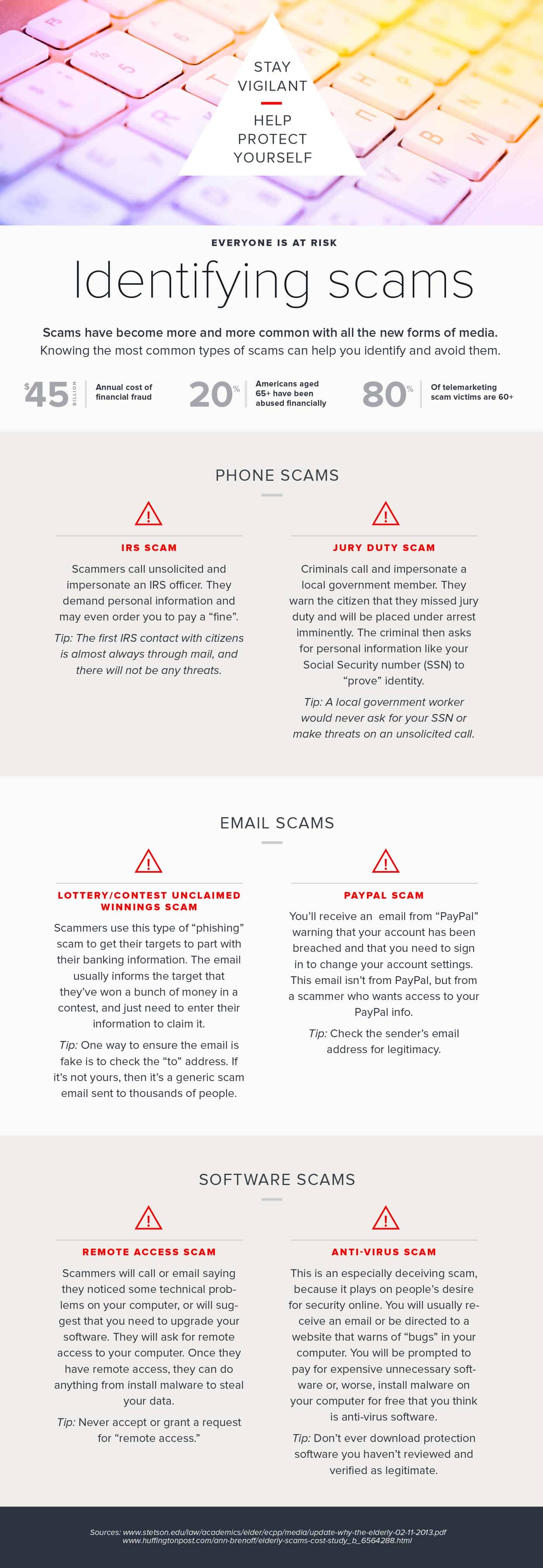These days, scams have become smarter and more sophisticated and we as consumers need to do our best to be aware of the latest and greatest scams out there targeting senior citizens. Medical Alert Advice’s friends at LifeLock (a Symantec company) have put together a very handy guide to identify scams, along with a useful guide about identity theft and how it works.
While everyone is at risk of being vulnerable to scams, there are some staggering numbers when it comes to seniors becoming victims. In fact, according to the infographic, 20% of Americans who are over 65 have been financially taken advantage of and over 80% of telemarketing scams prey on victims over the age of 60.
With all the new forms of media, scammers can come up with different ways to con you. Below this infographic, we will outline the most common types of scams and teach you how to avoid them.

Phone Scams
IRS Con: The most common type of phone financial scam is a call from IRS impersonators. If you get a call from someone claiming to be the IRS and asking for personal information, know that it is most definitely a trick. The IRS does not call citizens. If they want to get in touch with you, you will receive communications through the mail. And, the IRS would not threaten you with a fine for not giving up information. If you get a call from the “IRS” hang up immediately.
Jury Duty Trick: Thieves have been known to impersonate government officials with the claim that you have missed your jury duty. They will most likely ask you to provide your social security number to prove your identity. It may seem like a no-brainer not to provide this information over the phone, but these criminals can be convincing. Just remember a government worker would never ask for you SSN over the phone or be aggressive towards you. If anyone asks you for your social security number over the phone, end the call.
Email Scams
Lottery/Contest/Unclaimed Money Scam: With this type of scam, phishers will send you an email claiming you’ve won some sort of prize with the goal of getting you to provide your bank info. If it seems too good to be true, it probably is! Check the “To” address and if it is not yours, it is most likely part of a generic scam targeting thousands. We recommend deleting any emails claiming you won a prize for a contest you did not enter.
Bank/Paypal Scam: A popular scam right now is receiving an email from “PayPal” or whomever you do online banking with that your account has been compromised. The email is most likely from a scammer who has copied the same look and feel as the company you do business with. It is very convincing, so beware. Always check the senders email address as it will most likely be slightly off from a legitimate email from the institution. Never click through to links from an email. Type in the company’s name in a new tab on your computer and go directly to their site to find their contact information. You can always call the company direct to verify the email you received.
Software Scams
Remote Access Scam: If you ever get a call or email from someone asking for “remote access” to your computer for whatever the reason (telling you need to upgrade your software, fix technical issues, etc.) do not ever grant permission. The scammers are looking to steal your data or install malware to your computer.
Anti-Virus Scam: This is an alluring scam to prey on your sense of virus protection. If you get an email that directs you to a website that warns you of “bugs” on your computer, delete it. They are trying to get you to pay for unnecessary software or they may install malware onto your computer.
Just remember to stay vigilant and protect yourself and your aging loved ones from these scams. Education is important so make sure to talk to your elderly loved one about these scams that try to fraud seniors. Stay safe at home as well with a medical alert device. Read our Medical Guardian reviews for the latest. Feel free to share this post with all of your family and friends as well!
For further reading please see this article about scams targeting seniors and common tech scams.


